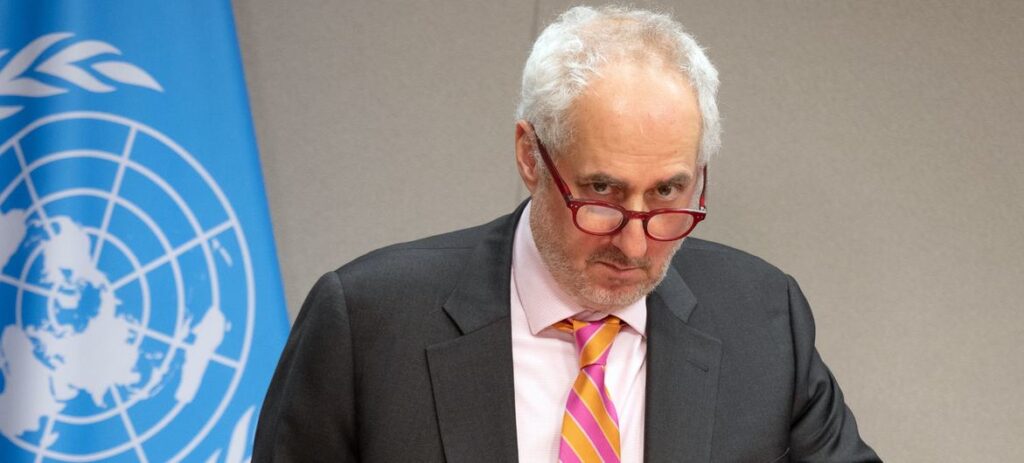The United Nations condemned a “horrendous” surge of violence in Sudan on Wednesday, citing a devastating attack on a maternity hospital that killed hundreds and a series of incidents that have claimed the lives of more than 1,200 patients and health workers since the conflict began.
U.N. spokesman Stéphane Dujarric, speaking at a media briefing in New York, expressed horror at “the tragic killing of more than 460 people, both patients and their companions,” at the Saudi Maternity Hospital in the besieged city of El Fasher. The attack, which underscores the war’s brutal toll on civilians, follows a pattern of recent assaults and abductions targeting health care workers.
The hospital massacre is a catastrophic peak in a long-running assault on Sudan’s medical infrastructure. Prior to this incident, the World Health Organization had verified 185 attacks on health care since the conflict erupted in April 2023, resulting in 1,204 deaths and 416 injuries among health workers and patients. Dujarric emphasized that the violence has intensified this year, with 49 attacks alone killing 966 people.
“The situation in North Kordofan is no better,” Dujarric said, detailing another deadly incident. The International Federation of Red Cross and Red Crescent Societies reported that five Sudanese Red Crescent volunteers were killed and three are missing after they were attacked while distributing food in the locality of Bara. In total, 21 Red Crescent staff and volunteers have been killed since the war started.
The humanitarian crisis, fueled by the violence, is spiraling. The International Organization for Migration reported that more than 36,000 people fled El Fasher in a three-day period this week. Many of those displaced are now living in the open with no shelter, sanitation, or protection, leaving women and girls at heightened risk of violence.
Meanwhile, thousands of the most vulnerable—including the elderly, people with disabilities, and the wounded—remain stranded in El Fasher, unable to flee due to insecurity and a lack of transport.
In response to the escalating needs, the U.N. Emergency Relief Coordinator, Tom Fletcher, approved a $20 million allocation from the Central Emergency Response Fund for Sudan. This adds to $27 million already allocated this year and will support emergency operations in Darfur and Kordofan.
The U.N.’s aid efforts face further political obstacles. The Sudanese government has declared two senior officials from the World Food Programme persona non grata and ordered them to leave the country without explanation.
“This decision to expel WFP’s Country Director and Emergency Coordinator comes at a pivotal time,” Dujarric said. “Humanitarian needs in Sudan have never been greater with more than 24 million people facing acute food insecurity and communities impacted by famine.”
The expulsions threaten aid delivery in a country where millions depend on emergency food assistance for survival. U.N. officials are engaging with Sudanese authorities to protest the action and seek a reversal.
Dujarric reiterated the U.N.’s call for all parties to the conflict to immediately halt hostilities, protect civilians and humanitarian workers, and guarantee safe, sustained access for aid.
“We can’t stress enough that civilians, humanitarian workers and medical personnel must be always protected,” he said.
RSF accused of targeting civilians
Sudan’s army-aligned government accused paramilitaries on Wednesday of attacking civilians in mosques during their recent takeover of the western city of El-Fasher, where satellite images show evidence of “continuing mass killing,” Yale researchers say.
The capture of El-Fasher on Sunday after an 18-month siege marked by starvation and bombardment has solidified the Rapid Support Forces’ (RSF) control over Darfur, sparking fears of ethnically motivated violence reminiscent of the region’s darkest days.
El-Fasher was the last of Darfur’s five state capitals to fall to the paramilitaries, led by General Mohammad Hamdan Dagalo, who have been at war with the regular army for more than two years.
“More than 2,000 civilians were killed during the militia’s invasion of El-Fasher, targeting volunteers in mosques and the Red Crescent,” Mona Nour Al-Daem, humanitarian aid officer for the army-aligned government, said Wednesday at a press conference in Port Sudan.
She added that the Adre border pass between Sudan and Chad has been “used to introduce weapons and equipment for the militias.”
An analysis of satellite images by Yale’s Humanitarian Research Lab released Tuesday night “corroborates evidence of continuing mass killing in the past 48 hours since RSF took control.”
“These mass killing events include corroboration of alleged executions around Saudi Hospital and a previously unreported potential mass killing at an RSF detention site at the former Children’s Hospital in eastern El-Fasher,” the group said, adding there was also ongoing “systematic killing” at one location outside the city.
El-Fasher had been the last holdout in Darfur of army chief Abdel Fattah Al-Burhan’s forces, and its fall has left the paramilitaries in control of a vast region covering a third of Sudan, with fighting now concentrated in the Kordofan region.
Since the city was captured by the RSF — descended from the Janjaweed militias accused of genocide in Darfur two decades ago — the group has again been accused of carrying out atrocities against civilians, with brutal videos circulating on social media.




